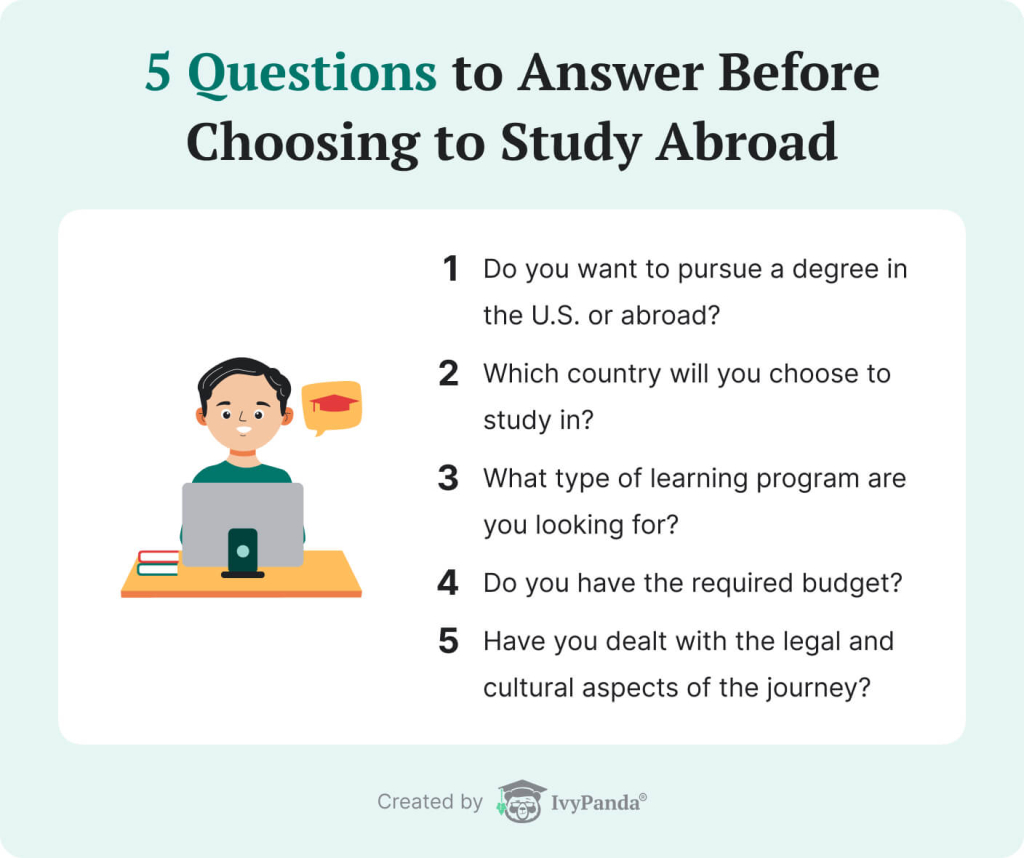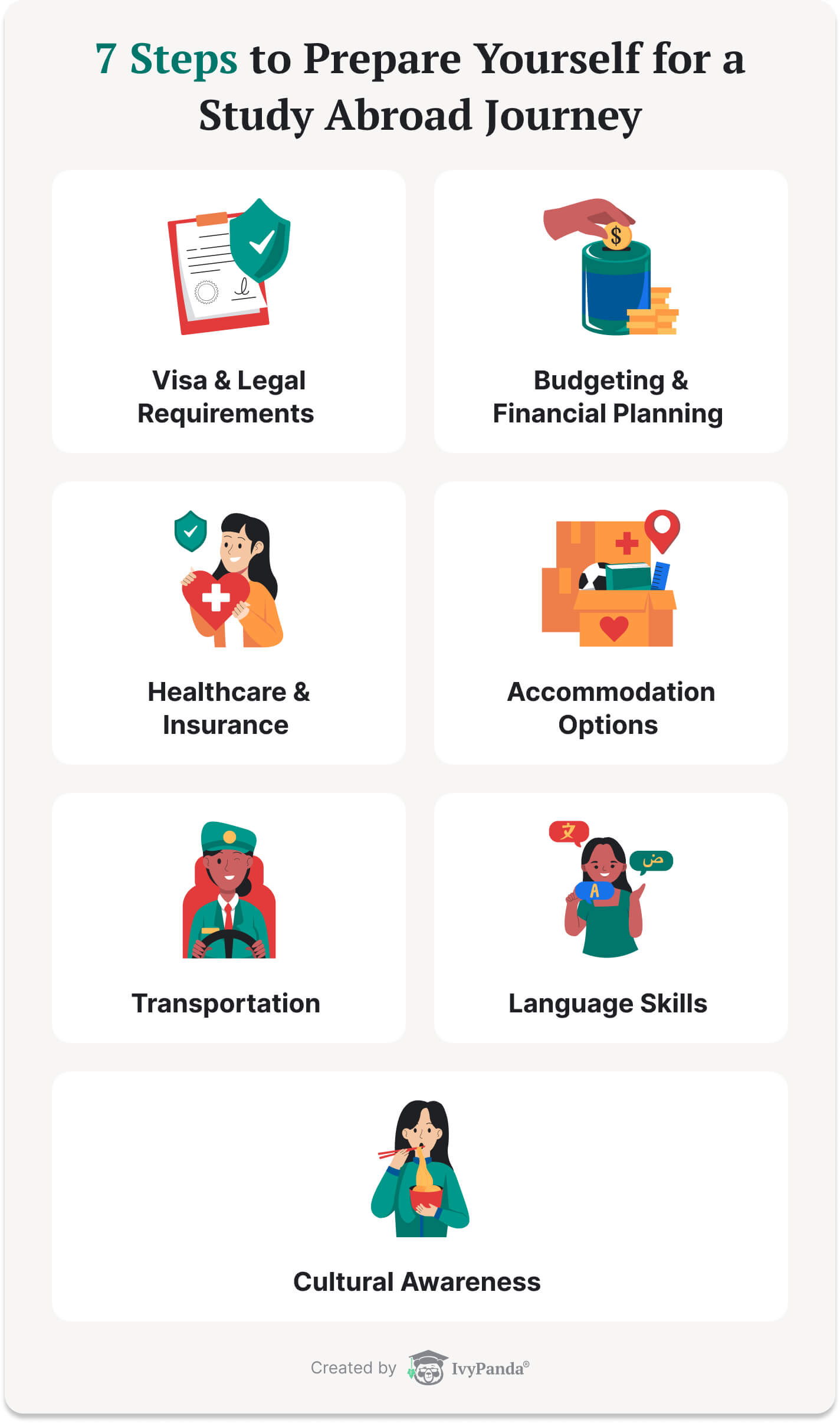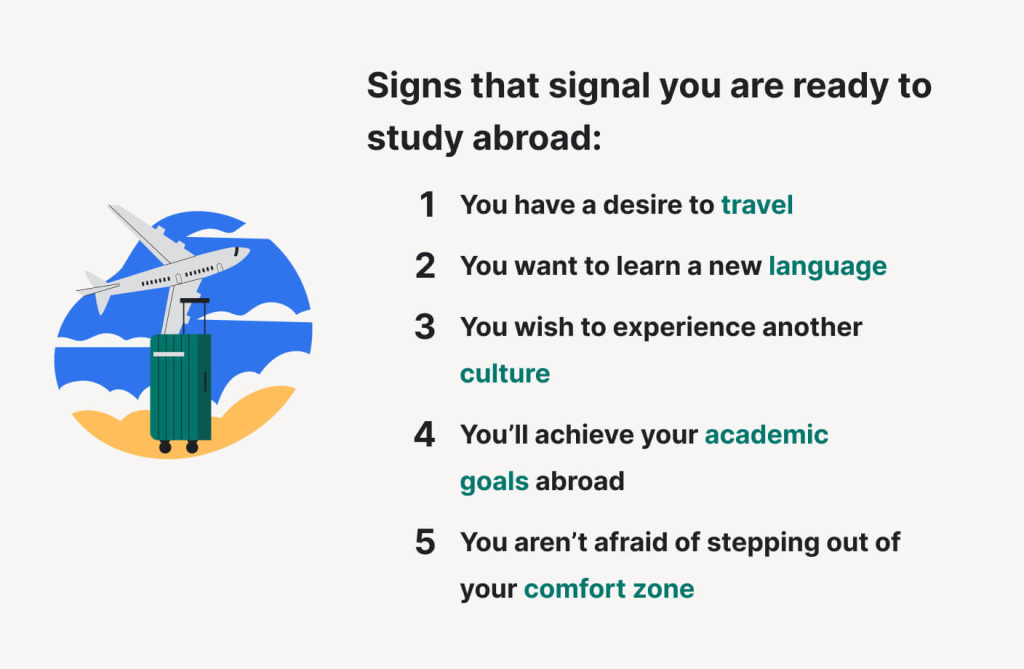Many Americans dream of studying in Europe, as this experience has the power to drastically transform their lives. This aspiration drives over 350,000 US applicants every year to seek a college education in this part of the world. Our team has created this guide to help higher education seekers select the right country and learning program. It will also delve into detail about the practical and cultural aspects of studying abroad.
This experience can reshape your worldview and open up novel career paths with the right approach. At the same time, it presents many distinct obstacles and issues that require careful preparation. We earnestly implore you to take this process seriously, as even staying at an American college can be challenging during the first year of your studies.
Rest assured, there’s nothing to worry about. This guide covers all journey aspects and ensures a pleasant learning experience. The world is ahead, so take your first step!
✈️ Why Study Abroad?
Everybody has their personal reasons for pursuing an education abroad, and your individual, career, and professional goals may influence this decision. It’s an exciting opportunity to experience life in other cultures, which can help you gain a deeper appreciation for different nations.

In addition to offering a rich experience, European countries often have significantly lower tuition fees, and some even provide free higher education for both local and foreign applicants. You’ll find numerous top universities to choose from, regardless of the field of study you wish to pursue. Many of these institutions regularly offer programs in English, making them a viable alternative to American colleges.
Benefits of Studying Abroad
We want to emphasize the positive aspects of this experience and what makes it truly life-changing. These reasons may inspire you to embark on this journey:
- Get to Know a Different Culture.
Studying abroad fully immerses students in foreign cuisine, traditions, customs, and societies. This experience can introduce you to an unfamiliar side of life and provide valuable learning opportunities.
- Learn New Languages.
Traveling overseas offers a natural way to practice second languages. You can quickly pick up French or German, as native speakers will be all around you, providing ample opportunities for practice with new friends.
- Build Life-Long Friendships.
Pursuing higher education in Europe can lead to many life-long friendships. It’s exciting to meet people who share your interests or who will introduce you to new experiences and perspectives.
- Cultivate Independence.
Traveling to and living in another country solo fosters character growth and teaches self-reliance. You’ll learn how to take control of various aspects of life and become a more independent person.
- Discover New Interests.
This is an opportunity to explore new activities, such as hiking, skiing, golf, and camping. It’s also a great way to spend time with your new college buddies.
- Gain Life Experience.
For many people, staying in a different country is a once-in-a-lifetime opportunity. In addition to receiving a high-quality education, you’ll create lasting memories and undergo personal transformation.
🎓 Types of Programs to Study Abroad
Selecting the right overseas learning program is akin to finding the perfect key to unlock your future career. Here, we explore various types of study plans, and we hope this information will assist you in making a well-informed decision.

- Academic Internships. These programs blend learning with practical work experience. Under academic internships, students work at organizations directly related to their chosen courses. You can opt for either full-time summer internships or part-time internships alongside your regular coursework.
- Direct Enrollment Programs. This option allows applicants to directly enroll in European universities. Under this program, you will pay tuition to the host institution, providing an alternative to student exchange initiatives.
- Exchange Programs. If you study at a US college, consider applying for an exchange program with an overseas higher education institution. Keep in mind that these programs may have limited participant slots.
- Faculty-directed programs. With this plan, you’ll attend a European college with guidance from one of the faculty members. Typically, such programs are relatively short, often running during spring break or the summer.
- Short-Term Programs. These programs typically span about eight weeks, although the duration can vary between institutions. Also, colleges may offer varying levels of support for participating students.
🤔 Europe vs. USA: Differences in Academic Systems
The United States and European countries offer distinct approaches to education. While you may have some understanding of what studying at a college in Florida entails, you might be less familiar with the organizational aspects of education in Norway. To help you prepare for the nuances of studying abroad, we’ve compiled information on the key differences between these systems.
Academics
Campus Life
Classes
Extracurricular Activities
Sports
🌍 Best Countries for Americans to Study in Europe
Europe offers a diverse mix of the world’s oldest universities and recently established colleges, all ready to provide top-tier education and accommodations. Below, we share a list of top countries that offer the best conditions for American students.
- England. This country is home to some of the world’s oldest and most prestigious schools, including the University of Cambridge and the University of Oxford. There are many places to visit in your spare time outside of college grounds. However, it’s worth noting that the average cost of admission can be a little steep for applicants.
- France. World-famous for its authors and cuisine, France offers many college options for American students to explore. The caveat lies in the fact that few French people speak fluent English, so it’s vital to study their language, even on a basic level.
- The Netherlands. In addition to excellent universities, this country offers a lot for American students. It boasts numerous museums, cultural landmarks, and art galleries to satisfy any taste. If you want to take a break from your studies and relax, visit the picturesque countryside for an unforgettable experience.
- Italy. One of the most beautiful regions of Europe offers affordable education and a truly cultural experience. Students studying at various Italian universities fully immerse themselves in rich history, world-renowned cuisine, and breathtaking views.
- Norway. This country is perhaps the best choice for students looking for accessible education. All of Norway’s public universities are tuition-free for learners from around the globe. If you don’t mind the cold climate, education in this Nordic region is a blast.

- Spain. Aside from offering numerous places with quality education, Spain boasts great historical sights, cultural landmarks, and tasty cuisine to explore. It’s also an excellent place to hone language skills while getting an education in business, finance, or marketing.
- Ireland. The Emerald Isle might have higher tuition fees than Spain, but it allows students to learn at some of the best universities. It’s a great place to study chemistry, pharmaceuticals, and technology while roaming the same streets that Oscar Wilde and other famous authors once did.
- Sweden. While the Scandinavian country has breathtaking views and a vigorous, sustainable living program, the cost of attending a university is pretty high. But, if you have the funds, traveling to Sweden is an opportunity to explore various winter sports and witness the northern lights.
- Germany. It’s highly possible to get an education and work experience through various internship programs here. Take a break from studying and visit Germany’s spectacular castles, or enjoy a cultural festival or two.
Top 7 Reasons to Study in Europe
Studying in Europe is a dream come true for students worldwide, and it’s easy to understand why. This colorful and diverse subcontinent offers many solid reasons to start your higher education journey here. Several factors draw students from across the world to European universities.
- High-Quality Education. Many European universities offer bachelor’s, master’s, and PhD programs, providing internationally recognized degrees in courses that best fit your academic and career aspirations.
- Professional Opportunities. Earning a diploma from a European institution and spending time as an intern will look great on your CV. You can even use this opportunity to improve your networking skills in various business circles.
- Living Costs. This region is a great choice due to low living costs. It’s possible to find affordable accommodations and travel across the subcontinent on a budget.
- Tuition Fees. European universities offer affordable tuition for American students, allowing you to receive a well-rounded education without being burdened by college loans for 10–20 years.
- Health Insurance. Europe boasts some of the lowest price tags for health insurance, with an average cost of $300 a year. It covers most procedures and treatments, reducing the amount you need to pay out of your pocket.
- Art, Culture, and History. Living and studying in this region provides students with a well-rounded cultural experience. It’s like walking through a book on art, culture, and history on your daily commute.
- Transportation. One of the best things about Europe is its public transportation system. The entire subcontinent is connected by an affordable railway system that offers 24-hour passes. Bus and taxi travel are also readily available, with many major cities having subway systems.
👨🎓 How to Prepare Yourself for a Study Abroad Journey in Europe
Preparing for an international study trip is an exhilarating experience, but it can also be overwhelming. You may have trouble gathering the appropriate documentation, balancing your budget, and arranging accommodations. We’ve dedicated this part of the article to the most essential facets of your trip to help you thoroughly prepare for your journey.

Visa and Legal Requirements
You can’t enter the European Union without an American passport and an appropriate visa. A lack of these documents makes the rest of your preparations pointless. On average, it takes roughly 6 to 10 months to get a passport. This procedure requires two correctly sized photos, your birth certificate, an ID, and a passport application. These should be delivered to your local post office or a State Department passport agency, along with the money for the fee.
Once you have the document, you can apply for a visa. There are numerous visa types, but you’re only interested in the student one. Once you obtain it, you can travel freely across the EU during your university time. The challenge is that each host country has different rules and requirements for the application process.
To understand which conditions apply to your individual case, check out the Travel.State.Gov website. It supplies detailed information about the requirements of each European state.
Budgeting and Financial Planning
Once you have obtained all the needed documents, work on a budget for your trip. Take the time to look into the local prices and decide on what will be enough to cover monthly spending. This list should include calculations for necessities such as housing, utilities, groceries, and study materials. Don’t rely on EU averages; instead, focus on the cost of living in a specific country.
While the prices of everyday items are relatively lesser than those of American goods and services, it’s still a good idea to be well-informed about the prices you’ll encounter. This way, you’ll have a lower chance of exceeding your budget.
Sometimes, you may be required to have a certain amount of funds in your bank account. Check with the university or local organizations for this information. If this is the case, explore your options before choosing the right bank. Many of these financial providers offer excellent student programs. Take the time to read the fine print or consult with specialists.
Now that you have an impression of what your European budget should look like, it’s time to discuss another important part of your trip: how much you will spend on education. The next segment will elaborate on this topic.
USA and Europe: Tuition Fee Comparison
The average price of tuition for colleges in the US has been widely recognized as a significant economic barrier for many individuals out there. However, how do education fees in America compare to those in Europe? Let’s find out together!
USA
France
Germany
Italy
The Netherlands
Spain
Sweden
Norway
England
Healthcare, Insurance & Emergency Contacts
In this section, we’ll address the equally important matters of ensuring your health and safeguarding your belongings. Understanding how different types of insurance work overseas can be tricky, but the proper preparations will ensure your stay is safe and enjoyable.
- Health insurance. Many European universities require students to have valid health insurance plans. We recommend researching local providers that offer discounts for college students.
- Travel insurance. There’s always a chance that your flight to Europe or back home will be canceled at the last minute. Consider purchasing travel insurance from an insurance agent abroad to protect your finances. This way, you’ll avoid unexpected out-of-pocket expenses.
- Emergency numbers. Print out and keep a list of emergency contacts in your wallet. Overseas authorities may need this information to contact your parents, relatives, or close friends in case of an emergency. Ensure your loved ones are aware of your contact information.
- Emergency preparedness. Life can be unpredictable, so it’s best to be prepared. Familiarize yourself with the locations of emergency exists in buildings and classrooms. Also, take note of nearby police stations.
- Pre-trip physical examinations. There’s nothing worse than starting your overseas journey with an illness. Before you board the plane, undergo a thorough medical examination to address any potential health issues that may arise during your European adventure.
Transportation
Europe boasts some of the best public transportation systems in the world, making it easy to navigate cities and countries.

However, there are several things you should do before and after getting there:
Before arrival:
- Study the local transportation system. You need to know the location of stations, routes, and how the ticket system works.
- Download public transport apps. These software solutions provide an easy way to order tickets for different public transport systems.
- Establish main locations. Check out where your university, accommodations, and airport are. This way, you’ll effortlessly adapt to your new setting.
After arrival:
- Apply for student fare programs. Provide proof of your student status and enjoy traveling with great discounts.
- Buy a college public transport card. European countries have excellent pass systems for students, allowing them to buy single or multiple tickets and rechargeable cards.
- Don’t be shy to ask for help. When traveling to an unfamiliar place, check with the locals or someone from the university to ensure you’re going in the right direction and have the right ticket.
Accommodation Options
European countries offer a variety of housing options for international students, including on-campus residences and rented rooms, studios, or apartments. To help you make the best choice for your living conditions, consider the following advice:
- Establish contact. Begin by reaching out to housing officers at your institution to inquire about available rooms. Some universities work with private housing providers. Even if on-campus options are limited, these professionals will help you find the best housing nearby.
- Be friendly with roommates. Many students will share accommodations with fellow learners. Your friendliness and sociability will enhance your experience and help you adjust to your new surroundings more comfortably.
- Determine your needs. Take some time to identify the type of living environment you want. Consider practicality and creating a positive atmosphere when arranging your room’s interior.
Language Skills
While English is widely spoken in many European countries, possessing knowledge of a foreign language can be a huge advantage. Brushing up on your German, Spanish, or Italian skills can be beneficial for asking for help, adapting to the local way of life, and making your daily routine more comfortable. Local students and residents will appreciate it if you address them in their native language.
Learning a new language is a rewarding way to spend time with fellow students. You can ask them to help you improve your language skills. If you don’t have the opportunity to practice with others or wish to prepare in advance, you can enroll in a language learning program, listen to podcasts, or download a language learning app. For example, you can try studying with Duolingo, HelloTalk, or Busuu.
Cultural Awareness
Appreciating other cultures helps you grow as a person and become more understanding of different customs and traditions. There are many cases where American students find these practices to benefit their daily lives and academic efforts. Even if you don’t wish to adopt the customs of the place you are visiting, being able to appreciate them builds character and manners. You can make this process more enjoyable with a few tips.
- Work on your communication skills.
Develop your capacity for intercultural communication through active listening, asking questions, and respecting other points of view. Use inclusive language and minimize the use of American slang to make conversations more clear. - Make friends with local students.
Having genuine friendships with local students is a great way to get to know the local culture. Participate in group projects, enter study groups, or have an occasional chat with a fellow student. These activities offer insight into the country’s cultural norms and values. - Embrace new experiences.
One of the best ways to improve cultural awareness is to make the most out of your stay abroad. Take any chance you have to talk to locals, international students, and faculty members. Share your traditions and beliefs to broaden your horizons. - Attend local events.
Many European universities hold cultural events and workshops. It’s a great way to find out about local customs and traditions. Also, don’t forget to participate in the celebration of national holidays and festivals; it can be a lot of fun.
🏠 Effective Methods to Beat Homesickness
Many students experience homesickness during their first time abroad. They leave their family and friends behind with the only online chats available. Such a situation can make you feel uneasy or distressed.

Luckily, several tips can help you manage and overcome these challenges:
- Accept your feelings. Everyone has been homesick before, especially when moving out of their hometown. Being on the other side of the world without convenient ways of visiting your friends and family can make you homesick. Instead of pushing these emotions away, welcome them and process them until they disappear.
- Establish a daily routine. Another effective method to deal with homesickness is organizing your daily activities. Teach yourself to wake up and go to bed during the same hours, set aside time for hobbies, plan your meals, and find your favorite spots around the city where you’re studying.
- Create a homely atmosphere. Even if you’re staying in a foreign country, making your accommodations feel like home is possible. Remember to pack some favorite things from the US. You can also buy local items associated with your favorite pastimes and hobbies.
- Explore new environments. Having a cozy dorm room can make you stay inside too much. That’s why it’s equally important to explore new locations and environments. Ask your new friends to visit local art museums, music festivals, libraries, or botanical gardens. Explore city corners and streets together.
- Stay in touch with your family. Being away from home doesn’t mean losing all contact with friends and relatives. Many free messenger and video call apps like Facebook and WhatsApp allow you to stay in touch with your loved ones during your European studies. Call them once or twice a week and tell them about your life abroad.
💡 10 Beneficial Tips to Study Abroad in Europe
As you might have gathered from this article, studying overseas is an unforgettable, transformative experience. Use these tips to make your trip extraordinary.
- Apply for a scholarship. While many European universities offer free higher education, other institutions still have student tuition fees. It’s possible to ease this burden by applying for scholarships.
- Start planning ASAP. Like any process, traveling abroad demands time and preparation. Don’t leave planning to the last minute; try to start organizing your trip as early as possible. Being on top of your preparation will make you less likely to forget important items and procedures.
- Expand your horizons. Going to a different country opens a world of opportunities. Use this time to learn a new language, try exotic dishes, and visit as many unusual places as possible.
- Take comfort items with you. When going overseas, bring some of your favorite things along. Having familiar items around your accommodations will help you adapt to your new surroundings.
- Get to know everyone online. To better accommodate your new lifestyle, sign up for the university’s Facebook groups and connect with other students online. This way, you get a chance to learn about your fellow students before you go.
- Check out your curriculum. Before the semester begins, you should thoroughly review the list of courses you have chosen. This way, you will know what you need to prepare for and what knowledge you might need to improve.
- Make a packing list. Create a list of things that you’ll bring along with you. Make sure you bring clothes suitable for the local weather conditions. The most important thing is to take all the necessary items, like your documents and medicines.
- Make a budget and stick to it. To make your stay comfortable, have a budget for your trip. Get a credit or debit card that can be used abroad to avoid paying extra for exchange rates.
- Don’t be afraid to make mistakes. Failing and making mistakes is a part of life. When studying overseas, you’re bound to make them, just like everybody else. Don’t dwell on these mishaps, and enjoy your studies.
- Record your experience. Save memories of studying abroad by making videos, diary entries, scrapbooks, and photos. Keep and bring home fliers and other memorable things from events and places you’ve visited.
Well-planned preparation, an open mind for new experiences, and high adaptability will allow you to make the most of this life-changing experience. Keep in mind that your life abroad isn’t just about getting a diploma. It’s an opportunity to connect with the world and make friends from around the globe. Remember our recommendations and embrace your journey of studying in Europe. If you have friends interested in a similar experience, share our guide with them.
🔗 References
- Top 6 Reasons to Study Abroad. – Kim Fischer, Temple University
- 4 Tips to Help You Decide Where to Study Abroad. – Georgetown University
- Steps to Study Abroad. – American University
- Being a U.S. American Abroad. – Middlebury C.V. Starr Schools Abroad
- Coping with Homesickness. – MIT Medical
- How Bachelor’s Degrees in the U.S. and Europe Differ. – Anayat Durrani, U.S. News & World Report L.P.
- Benefits of Studying Abroad – NC State University
- Study Abroad – University of Maryland


![55 Study Abroad Statistics: Facts and Figures [2026 Updated]](https://ivypanda.com/blog/wp-content/uploads/2020/11/travel-necessities-309x208.jpg)
